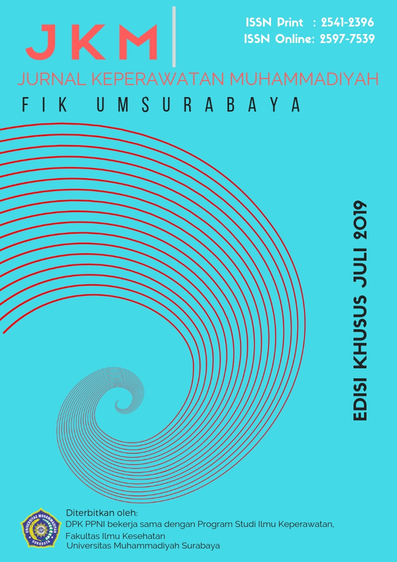Pengaruh Faktor Pendidikan Terhadap Akses Dan Kepatuhan Pengobatan Malaria Di Kabupaten Sikka Tahun 2018
DOI:
https://doi.org/10.30651/jkm.v4i2.2310Keywords:
Malaria, education, access and treatment adherenceAbstract
Objective: Â to determine the effect of educational factors on the access and compliance of malaria treatment in Sikka District which is currently leading to the stage of malaria elimination.
Methods: Â The design of this study was a cross sectional observational analytic study conducted in seven malaria-endemic health centers in Sikka based on 2016 cases in April-May 2018. Information on medication practices and the use of anti-malarial drugs was collected using interview techniques using a structured questionnaire. A total of 32 samples were obtained from malaria patients 15 years years old who had previously undergone malaria treatment. Confirm the results of blood tests using a microscope.
Results: Â Fisher Exsact statistical test results using SPSS education and access variables obtained p value 0,012 <0,05 indicates that there is an influence between the level of education to access of treatment and p value of 0,227> 0,05 for education variables and adherence to treatment shows no influence level of education with adherence of malaria treatment.
Conclusion: Â There is an influence of educational factors on the appropriateof access to malaria treatment, but has no effect on adherence of malaria treatment in Sikka District.
References
Asih, PB., Rogers, WO., Susanti, AI., Rahmat, A., Rozi, IE., Kusumaningtyas, MA., Krisin, Sekartuti, Dewi, RM., Coutrier, FN., Sutamihardja, A., Ven, AJAM., Sauerwein, RW and Syafruddin D. 2009. Seasonal distribution of anti-malarial drug resistance alleles on the island of Sumba, Indonesia. Malaria Journal, 8,222-229.
Astuti, W., dkk. 2008. Hubungan Perilaku Vulva Hygiene dengan Kejadian Keputihan pada Remaja Putri Kelas X di SMU Negeri 2 Ungaran Semarang. Jurnal Kebidanan dan Keperawatan, 4(2),59-65.
Bannett, A., Avancena, ALV., Wegbreit, J., Cotter, C., Roberts, K., Gosling, R. 2017. Engaging the private sector in malaria surveillance ; a review of strategies and recommendations for elimination setting. Malaria Journal, 16,1-19.
Brunner and Suddarth. 2002. Buku Ajar Keperawatan Medikal Bedah, edisi 8 volume 2. Jakarta : EGC.
Castro, CGSO., Mutis, MCS., Miranda, ES and Luz, TCB. 2015. Dispensing and determinants of non adherence to treatment for non complicated malaria caused by Plasmodium vivax and Plasmodium falciparum in high risk municipalities in the Brazilian Amazon. Malaria Jounal, 14(471),1-7.
Chen, I., Thanh, HNT., Lover, A., Thao, PT., Luu, TV., Thang, HN., Thang, ND., Neukom, J and Bennett, A. 2017. Malaria risk factors and care-seeking behaviour within the private sector among high -risk populations in Vietnam: a qualitative study. Malaria Journal, 16(414),2-14.
Dinas Kesehatan Kabupaten Sikka. 2018. Provil Kesehatan Sikka Tahun 2017. Maumere.
Gueye, CS., Newby, G., Hwang, J., Phillips, AA., Whittaker, M., MacArthur, JR., Gosling, RD and Feachem RGA. 2014. The challenge of artemisinin resistance can only be met by eliminating Plasmodium falciparum malaria across the Greater Mekong subregion. Malaria Journal, 13,2-4.
Kementerian Kesehatan RI. 2013. Peraturan Menteri Kesehatan Republik Indonesia Nomor 5 Tahun 2013 Tentang Pedoman Tata Laksana Malaria. Jakarta : Kementerian Kesehatan RI.
Kementerian Kesehatan RI. 2016. Provil Kesehatan Indonesia Tahun 2015. Jakarta : Kementerian Kesehatan RI.
Khantikul, N., Butraporn, P., Kim, HS., Leemingsawat, S., Tempongko, MASB and Suwonkerd, W. 2006. Adherence to Antimalarial Drug Therapy among Vivax Malaria Patients in Northern Thailand. Journal of Health, Population and Nutrition, 27(1),4-13.
Ladner, J., Davis, B., Audureau, E and Saba, J. 2017. Treatment-seeking patterns for malaria in pharmacies in five sub-Saharan African countries. Malaria Journal, 16(353),1-13.
Newton, P., Caillet, C and Guerin, PJ. 2016. A link between poor quality antimalarials and malaria drug resistance. Expert of anti-infective therapy, 14(6),531-533.
Notoatmodjo S.2009. Kesehatan Masyarakat. Ilmu dan Seni. Jakarta : PT. Rineka Cipta.
Okuboyejo, S. 2014. Non-Adherence to Medication in Outpatient Setting in Nigeria: The Effect of Employment Status. GlobalJournal of Health Science, 6(3),37-44.
Onyango, EO., Ayodo, G., Watsierah, CA., Were, T., Okumu, W., Anyona, SB., Raballah, E., Okoth, JM., Gumo, S., Orinda, GO and Ouma, C. 2012. Factors associated with non-adherence to Artemisinin-based combination therapy (ACT) to malaria in a rural population from holoendemic region of western Kenya. BMC Infectious Diseases,12,143-152.
Seuk Y. 2006. Faktor perilaku pengobatan yang berhubungan dengan resistensi klorokuin pada penderita malaria falciparum di Kabupaten Belu. Skripsi. Universitas Airlangga, Indonesia.
Soekanto. 2007. Sosiologi Suatu Pengantar. Jakarta : PT Raja Grafindo Persada.
Watsierah, CA., Jura, WGZO., Raballah, E., Kaseje, D., Abong’o, B and Ouma, C. 2011. Knowledge and behaviour as determinants of anti-malarial drug use in a peri-urban population from malaria holoendemic region of western Kenya. Malaria Journal, 10(99),1-7.
World Health Organization. 2016. World Malaria Report 2016. Prancis.
World Health Organization. 2010. Basic malaria microscopy seconde edition. Swittzerland.
Wuryanto, MA. 2008.Tingkat Kepatuhan Penderita Malaria Vivax Dalam Minum Obat Serta Faktor Yang Mempengaruhinya-Studi Pada Penderita Malaria Vivax Di Kabupaten Banjarnegara Tahun 2005. Jurnal Promosi Kesehatan Indonesia, 3(1),24-30.
Downloads
Published
Issue
Section
License
- Penulis tetap memegang hak atas karyanya dan memberikan hak publikasi pertama kepada jurnal ini yang secara simultan karya tersebut dilisensikan di bawah:Â Creative Commons Attribution-ShareAlike 4.0 International (CC BY-SA 4.0)













